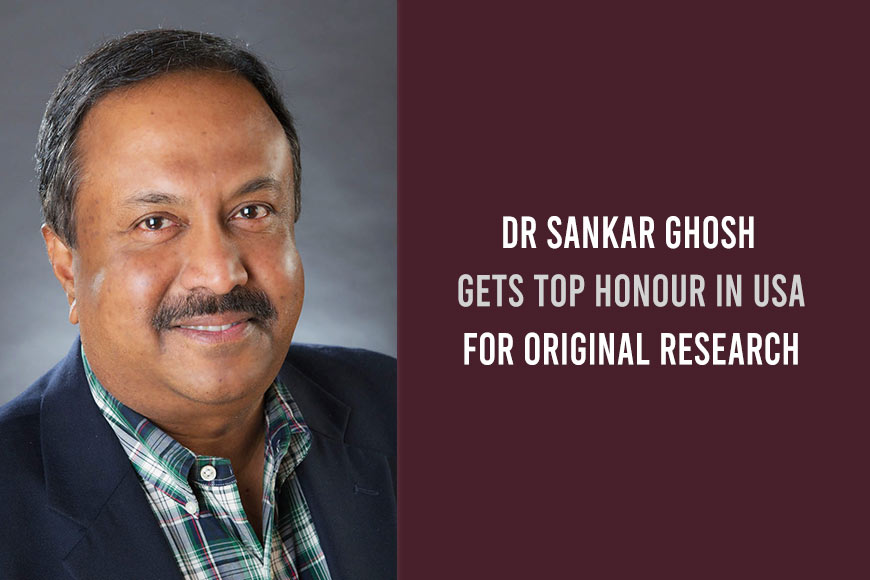Bengali immunologist gets top honour in USA for original research

PHe has long been involved in researching the connection between the immune system in the human body and various diseases, from cancer to sepsis to diabetes and more. He has a deep interest in deciphering the complexities of transcriptional regulation—the ways by which a cell regulates the conversion of DNA to RNA—to better understand the mechanisms of the immune system and the pathological changes that occur to its pathways in many diseases. Recipient of several prestigious honors, award-winning immunologist Dr Sankar Ghosh, PhD, has been elected to the National Academy of Sciences in recognition of his distinguished and continuing achievements in original research.
The National Academy of Sciences is a private, nonprofit institution that was established under a Congressional charter signed by President Abraham Lincoln in 1863. It recognizes achievement in science by election to membership and, with the National Academy of Engineering and the National Academy of Medicine, provides science, engineering, and health policy advice to the federal government and other organizations.
Dr Ghosh is the Silverstein and Hutt Family Professor of Microbiology and chair of the Department of Microbiology and Immunology at the Vagelos College of Physicians and Surgeons. He is among 120 newly elected members announced by the Academy this year.
Dr Ghosh is the Silverstein and Hutt Family Professor of Microbiology and chair of the Department of Microbiology and Immunology at the Vagelos College of Physicians and Surgeons. He is among 120 newly elected members announced by the Academy this year. Prior to him, Nobel Prize winner economists, Dr Amartya Sen and Dr Abhijit Vinayak Banerjee, are the other two Indian scholars who have been honoured with the prestigious membership of the Academy.
A resident of Salt Lake, Dr Ghosh completed his Master’s degree in Bio-chemistry from Calcutta University and then went to the US for further studies.
He received his PhD from Albert Einstein College of Medicine, New York in 1988, and thereafter he did his post-doctoral work at Whitehead Institute, Cambridge Massachusetts Institute of Technology (MIT) under the supervision of Nobel laureate, David Baltimore. While conducting postdoctoral research early in his career, Ghosh produced seminal work in understanding the regulation of Nuclear Factor-kappa B, a transcription factor with an important role in regulating the expression of many genes involved in the immune system.
He joined Yale University in 1991 as Professor of Immunobiology, Molecular biophysics and Biochemistry, and Molecular, Cellular and Developmental Biology, and researcher where he continued working for 17 years. In 2002, he was named a Howard Hughes Medical Investigator by Howard Hughes Medical Institute. He was also awarded the Ranbaxy Science Foundation's Annual Research Awards for the year 2005. In 2007, he was named as a Fellow of the American Association for the Advancement of Science (AAAS), for ‘distinguished contributions to the field of immunology, particularly for studies of the NF-êB signaling pathway.’
Dr Ghosh joined Columbia in 2008. He was previously a Howard Hughes Medical Institute Investigator. He is currently Chairman, Department of Microbiology and Immunology at Columbia University Medical Center. Most recently, Dr Ghosh and members of his lab uncovered new clues to sepsis that may speed diagnosis.
Dr. Ghosh has served in an advisory capacity for several organisations, including the Board of Scientific Counselors of the National Cancer Institute and the Advisory Board of the Center on Immune Receptors at the Karolinska Institute in Stockholm, Sweden. He is currently a member of the Board of Management of the National Center for Biological Sciences in Bangalore, India; the Scientific Review Board of the Damon Runyon Cancer Research Foundation; and the Scientific Review Council of the Leukemia and Lymphoma Society. He also serves on the editorial board of multiple journals including Immunity, Molecular and Cellular Biology and the Journal of Biological Chemistry. He has published more than 100 articles. He also served on the Life Sciences jury for the Infosys Prize in 2011.
Dr Ghosh joined Columbia in 2008. He was previously a Howard Hughes Medical Institute Investigator. He is currently Chairman, Department of Microbiology and Immunology at Columbia University Medical Center. Most recently, Dr Ghosh and members of his lab uncovered new clues to sepsis that may speed diagnosis. They identified two micro-RNAs produced in immune cells during prolonged inflammation and found that in a mouse model of sepsis, these micro-RNAs suppressed the immune system at a critical time when a full immune response was needed. Their findings suggest the two micro-RNAs could inform a test to help physicians classify patients into those with milder infections versus others with organ failure who are at high risk of sepsis and death.
A typical adda-loving Bengali to the core, Dr Ghosh returns to his beloved Kolkata annually for a breath of fresh air and the mandatory dose of long, uninterrupted adda sessions with his friends and extended family who are all scattered in and around the city and beyond to rejuvenate his worn-out soul. His inclusion as an elected distinguished member of the National Academy of Sciences has added a feather in his cap and his friends are waiting for his return to the city to celebrate the occasion.










